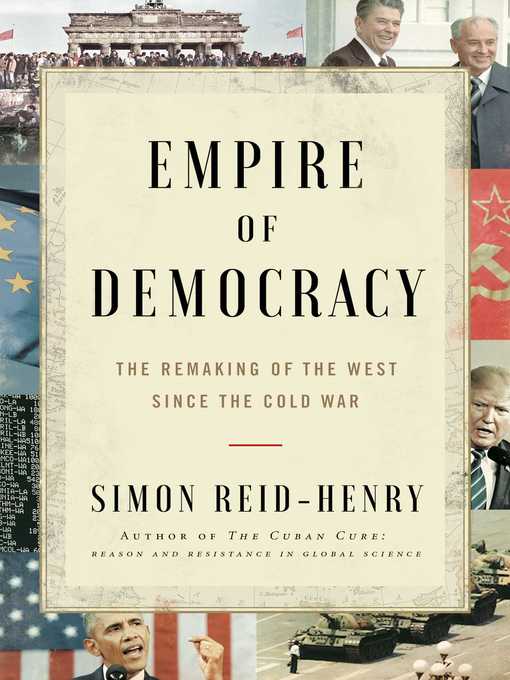
Empire of Democracy
The Remaking of the West Since the Cold War
کتاب های مرتبط
- اطلاعات
- نقد و بررسی
- دیدگاه کاربران
نقد و بررسی

April 15, 2019
A sweeping exploration of how voter apathy, distrust of government, ideological extremism, and economic inequality point to a crisis of democracy. Along with many contemporary political analysts, such as William Davies and Timothy Snyder, Reid-Henry (Geography/Queen Mary, Univ. of London; The Political Origins of Inequality: Why a More Equal World is Better for Us All, 2015, etc.), a senior researcher at the Peace Research Institute, Oslo, is alarmed about the erosion of civic engagement and "loss of moral legitimacy" in Western democracies. Democracy, he asserts, is struggling to live up to its core value: a "commitment to reconciling pluralism with political justice." In a capacious, hugely ambitious study of the last 40 years, the author chronicles when and how this crisis began. In the 1980s, tension between freedom and equality, individual demands and common needs, intensified under the "laissez-faire market economics" of the U.S. and U.K. Tax cuts undermined publicly funded mandates, regulation and oversight were rolled back, and public entities such as schools and prisons were handed over to for-profit businesses. Social welfare programs were "defunded, outsourced, means-tested," and the family, rather than the community, was touted as "the central unit" of society. By the end of the 20th century, Reid-Henry asserts, "the reigning liberal blueprint was that of societies governed at a distance"; "collective thinking" was subsumed by individual interests. Moreover, wealth gained outsized influence, with public policies increasingly enacted not "to safeguard democracy" but, with great vigor, "to save capitalism." In the current climate, politicians focus on how to win support from "powerful business lobbies, corporate managers, and international finance" rather than on promoting and publicizing a democratic political vision. Instead of debating issues, politicians now rely on "charisma" to win over voters. The author's cogent analysis is undermined at times by convoluted prose, and although his evidence is abundant and compelling, the book might well have been judiciously honed. Nevertheless, he conveys an important message: Individual political action must become accountable to society's interests. A persuasive argument that democratic values can be revived.
COPYRIGHT(2019) Kirkus Reviews, ALL RIGHTS RESERVED.

Starred review from May 1, 2019
With this latest work, Reid-Henry (geography, Queen Mary Coll., Univ. of London; The Political Origins of Inequality) details how states and economies have changed from 1970 to the present, and how the consequences of those changes affect, and take hold over, popular government in supposedly democratic Western societies. The author pursues this transformation along two axes, political and economic, showing how changes in both arenas have interacted with current crises to create a near perfect storm of change in the notion and practices of what it means to be a democracy today--long-held notions and practices on the importance of equality, including the idea that everyone has the right to be heard, have been put aside in favor of market freedom and the ascendancy of a new economic elite. Reid-Henry writes as a historian but comes across accessibly: this is what happened and here is where we are now. He concludes not with recommendations for reform so much as a plea for hope. VERDICT One of the important books of the current dialog on Western democracy. All serious scholars and informed political science and history readers should find it worth the effort.--David Keymer, Cleveland
Copyright 2019 Library Journal, LLC Used with permission.

June 10, 2019
Historian Reid-Henry (The Cuban Cure) attempts, with mixed success, to corral and synthesize the last half-century of Western democratic states in this sprawling history, which begins with the Paris protests in the summer of 1968 and stretches to the 2016 votes triggering the U.K.’s withdrawal from the European Union and electing Donald Trump as U.S. president. Reid-Henry’s scholarship is impressive, gathering a wide range of historical anecdotes and referencing a diverse set of thinkers (citing Betty Friedan, Daniel Boorstin, and John Kenneth Galbraith on a single page), but this erudite and formidable project ultimately falters under the immense weight of its massive ambitions. The overwhelming volume of varied historical and cultural events—ranging from the emergence of the gay rights movement, the fall of the Berlin Wall, the freeing of Nelson Mandela, and the Clinton impeachment to the release of the movie The Blair Witch Project—require jumping from event to event with dizzying speed. Moments of succinct, elegant analysis, such as his insightful summation of the 1980s conservative movements (“the Thatcher-Reagan brand of neoliberalism actively required the state and its levers of control. Its task was not to reduce state power but to transform it.”) can be lost among verbose passages. The immense scope and intermittently dense prose make this a daunting task for all but the most committed of readers.

























دیدگاه کاربران